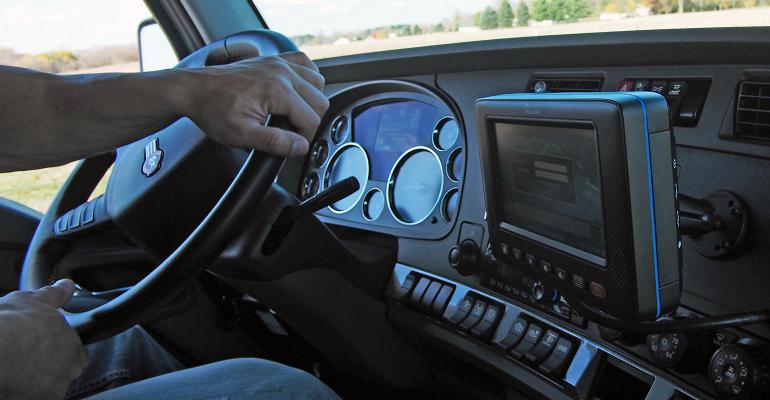Canada Sets its ELD Mandate Timeline
Commercial truck and bus drivers in Canada will move from paper logs to electronic logging devices by 2021. Canadian and U.S. operators can use the same ELD in both countries.

Some 18 months after the U.S. started requiring electronic logging devices (ELDs) in commercial trucks, Canada drew up similar plans to electronically log the service hours of commercial drivers in the Great White North.
Marc Garneau, Canada’s Minister of Transport, said on June 13 that his country is mandating the use of ELDs by federally regulated commercial truck and bus operators.
The new requirement will come into force on June 12, 2021, and will replace paper-based daily logbooks. This requirement builds on the regulatory proposal that was published in Canada Gazette, Part I on December 16, 2017.
“The government of Canada is committed to improving road safety in order to keep all Canadian road users safe,” a government press release explained. “Commercial driver fatigue is a long-standing road safety issue, and that’s why the government is taking new measures to address this issue.
“This new requirement is the result of longstanding collaboration among all levels of government and industry partners. It also addresses a Saskatchewan Coroners Service recommendation following the tragic collision involving the Humboldt Broncos junior hockey team.
“Electronic logging devices are tamper-resistant devices that are integrated into commercial vehicle engines. They are intended to ensure that commercial drivers drive within their daily limit and accurately log their working hours. The devices track when and how long drivers have been at the wheel, and ensure they are complying with the Government of Canada’s Commercial Vehicle Drivers Hours of Service Regulations.
“Use of the devices also reduces administrative burdens, such as eliminating the need for paper daily logs and reducing the time enforcement officers need to verify regulatory compliance. Additionally, these new devices are aligned with the United States road safety regulations and will support economic growth, trade, and transportation on both sides of the border.”
“These new mandatory logging devices in commercial vehicles will improve safety for drivers and for all Canadians,” said Garneau. “Collaboration with stakeholders and partners was key to putting these regulations in place. I thank my provincial and territorial colleagues in helping to develop this technical standard and look forward to them introducing this requirement for operators within their jurisdictions. We know that fatigue increases the risks of accidents and that is why we are taking action across all modes of transportation.”
Scott Smith, chairman of the Canadian Trucking Alliance, noted: “This regulation will help to level the playing field for compliant carriers and allow them to compete with rates that are achievable in the legal environment they operate in. It will help enforcement officers more easily verify compliance and remove those operators from the road who are not operating legally, improving road safety for all users.”
Added Mike Millian, president, Private Motor Truck Council of Canada:
“The vast majority of our companies and drivers in our industry fully comply with hours of service rules, but, undoubtedly, the implementation of tamper-proof, third-party electronic logging devices will further enhance safety and help ensure all drivers and companies hold themselves to the highest levels of compliance.”
As part of the regulatory development process, Transport Canada is committed to aligning with vehicle regulations in the U.S. to the fullest extent possible provided that it is in the best interest of Canadians.
By further aligning Canadian and U.S. logging device regulations, Canadian and U.S. operators can use the same logging device in both countries.
Transport Canada estimates that the mandatory requirement for electronic logging devices will reduce the risk of fatigue-related collisions by approximately 10%.
About the Author(s)
You May Also Like


